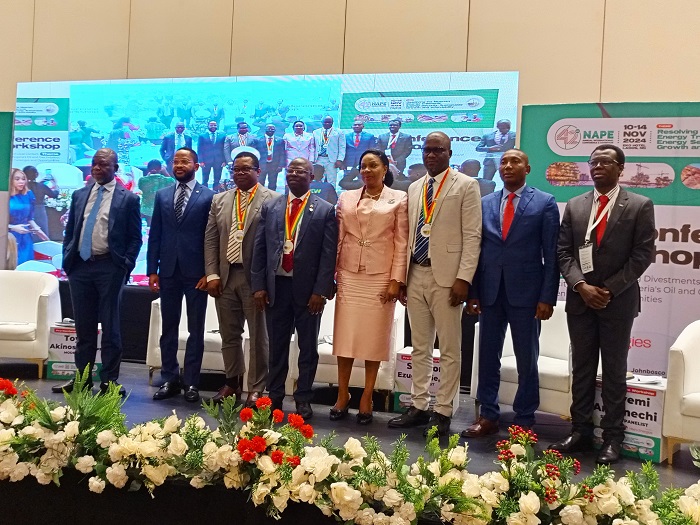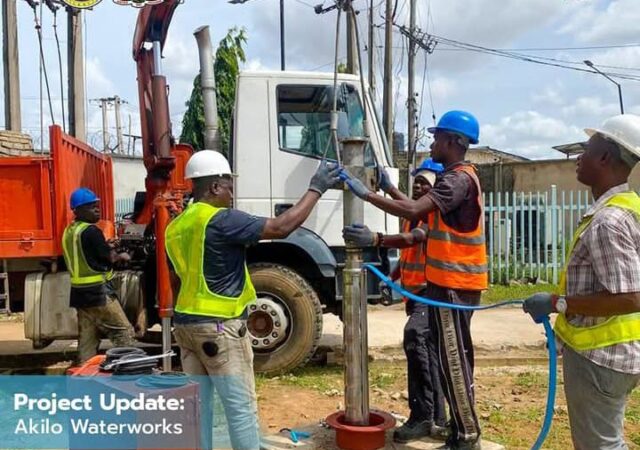As the 42nd annual international conference of the Nigerian Association of Petroleum Explorationists (NAPE) approaches, taking place from November 10-14, a pre-conference workshop has been held to discuss critical issues impacting the industry.
In his opening remarks, Dr. Abiodun Ogunjobi, President of NAPE, emphasized the importance of the pre-conference theme: “Leveraging Divestments and Local Content Capacity to Enhance Nigeria’s Oil and Gas Industry: Challenges and Opportunities.” citing it as an avenue to address various gray areas affecting operators in the sector.
“It is undeniable that the Nigerian oil and gas industry is at a pivotal moment where strategic divestment and capacity enhancement are essential for driving growth and sustainability. Navigating the associated challenges and opportunities is crucial for achieving long-term industry ambitions and ensuring a stable and transparent regulatory environment,” Ogunjobi stated.
He pointed out that changes in policy and regulation can hinder investment in the oil and gas sector, highlighting that access to capital remains a significant barrier for local companies seeking to expand. Proper management of financial risks is vital, especially in the context of divestment, to ensure local companies can sustain operations afterward.
Ogunjobi also stressed the need to build and enhance local capacity to meet industry demands. Leveraging divestment while boosting local content capacity presents a unique opportunity to transform Nigeria’s oil and gas sector, with sustainability ensuring long-term goals and environmental stewardship.
The workshop provided a valuable platform for industry experts, policymakers, and stakeholders to discuss key issues surrounding divestment and local capacity development. Participants explored potential benefits and strategies while identifying challenges and seizing opportunities.
“As we engage in discussions about divestment today, let us keep our ultimate goal in mind: to build a resilient, sustainable, and prosperous oil and gas industry in Nigeria. The insights and strategies developed here will play a crucial role in shaping the future of our industry,” Ogunjobi concluded.
Marginal Field Program and Local Successes
The Marginal Field Program, resulting from divestments by International Oil Companies (IOCs), led to the emergence of 24 blocs bid on by indigenous companies. However, only seven have seen success, with some struggling against potential license revocations, while others celebrate their perseverance.
Adegbite Falade, Managing Director of Aradel Holdings Plc, discussed the company’s pioneering role in the Ogbele field, acquired from Chevron. Initially producing 1,000 barrels per day in 2000, production has now peaked at 30,000 barrels. Registered on the stock market, Aradel has seen significant growth.
Falade emphasized that Aradel’s strategy focuses on technology, capacity expansion, and diversification, which includes a gas station and refinery operations alongside renewable energy initiatives. He noted that challenges such as funding and regulatory hurdles exist, but divestment also presents exploration opportunities.
Mr. Olarewaju Daramola, General Manager of Aradel, added that the sector’s fundamentals are global. The company collaborates with indigenous players to adopt technology and train the next generation of professionals, improving the performance of local contractors and vendors as part of its social initiatives.
Operational Insights
Samuel Nwanze, Chief Financial Officer (CFO) of Heirs Energies Limited, representing the company’s Managing Director and CEO, Osayande Igiehon, emphasized the need for players in the sector to have a comprehensive understanding of the industry.
He shared that Heirs Energies’ acquisition occurred in 2021, with production projections rising from 21,000 to 50,000 barrels per day within just 100 days—a clear success story. He noted the company’s focus on joint venture (JV) partnerships and highlighted Nigeria’s strong entrepreneurial spirit.
Despite facing challenges, Heirs Energies has experienced growth. Nwanze identified aging infrastructure as a significant challenge that must be addressed, particularly through the replacement of old facilities. The company encountered existential threats but managed to recover by conducting thorough analyses to identify problems.
To tackle high operational costs, innovative solutions were employed, including alternative evacuation methods through pipeline operators in collaboration with JV partners.
Nwanze identified theft as a critical challenge, explaining that the company implemented technology and engaged with host communities to mitigate losses. Using three strategic pillars, Heirs Energies recovered 96% of its losses and resolved measurement and metering issues, marking a shift in the industry structure toward greater collaboration among indigenous operators.
He advocated for capacity development, stating that independent operators have a better understanding of risk. Nwanze stressed that opportunities for innovation and technological advancement, bolstered by strategic partnerships, will benefit operators in the industry. He also emphasized the importance of nurturing the next generation to sustain progress in the sector.
Addressing Regulatory Challenges
Victor Diseiye Otobo, Head of the National Oil and Gas Excellence Centre at the Nigerian Upstream Petroleum Regulatory Commission (NUPRC), stated that Nigeria possesses 37.5 billion barrels of oil condensate and 209.26 trillion cubic feet of natural gas reserves. He addressed concerns that regulatory functions have hindered growth, explaining that after ten years without operation, blocs will be resold or revoked.
Otobo highlighted NUPRC’s achievements, including establishing the oil and gas excellence center to address capacity gaps in the industry. He assured stakeholders that tax incentives, bid round opportunities, and proper regulatory codes have been implemented to support operators, while emphasizing that the Petroleum Industry Act (PIA) has introduced essential transparency measures.
Future Prospects and Collaborative Efforts
Samson Ezuguorie, Chief Operating Officer of Seplat Energy Plc, highlighted the challenges posed by illegal connections and security threats that contribute to crude losses. He advocated for investment in innovative solutions to improve production and regulatory policies that support indigenous companies.
Uju Ifejika, Chairman and CEO of Brittania-U, called for adjustments to the PIA to create a more favorable environment for local operators. She emphasized the need for collaboration among industry players to address ongoing challenges.
In summary, the pre-conference workshop served as a critical dialogue platform, allowing stakeholders to address pressing issues while charting a path forward for the oil and gas industry in Nigeria. With collaboration, innovation, and a commitment to sustainability, participants indicated their fervent belief in hope for a prosperous future.








An interesting discussion is worth comment. I think that you should write more on this topic, it might not be a taboo subject but generally people are not enough to speak on such topics. To the next. Cheers
I was just seeking this information for a while. After six hours of continuous Googleing, at last I got it in your web site. I wonder what’s the lack of Google strategy that don’t rank this kind of informative sites in top of the list. Generally the top web sites are full of garbage.